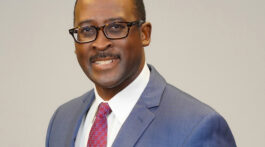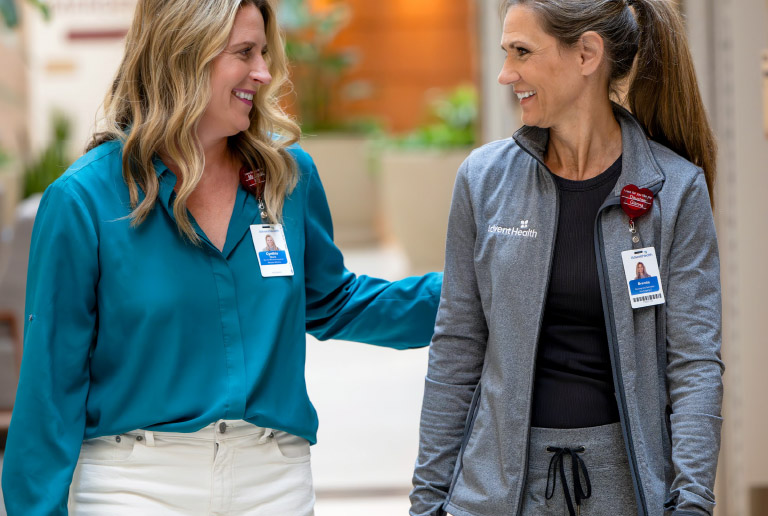Elizabeth Marin-Rodriguez, a staff chaplain at AdventHealth Shawnee Mission, considers it a good day when she is interrupted. In fact, the more interruptions, the better the day.
“My best day is when I am interrupted when I’m headed to a meeting or headed to see a patient because a team member wants to tell me something,” Marin-Rodriguez says. “It’s those unexpected, non-scheduled interactions that I enjoy the most because they remind me of my purpose. Our mission is Extending the Healing Ministry of Christ, and I’m reminded that Jesus often had the opportunity to minister to someone when He was on His way to do something else.”
As a hospital chaplain, Marin-Rodriguez spends much of her time attending the spiritual needs of patients and their families. But she spends equal time supporting the spiritual needs of the people caring for those patients.
“We are all one,” Marin-Rodriguez says. “We’re one team and we need to make sure we’re providing spiritual care to our team members so they can extend it to our patients.”
Filling the Cup
Across the AdventHealth Mid-America region, which includes hospital facilities in the Kansas City and Denver areas, there are close to 40 team members who are part of the health system’s spiritual integration teams. While some are ordained ministers, many also serve in non-pastoral roles helping ensure that the spiritual and physical health needs of patients are addressed. Equipping staff to provide whole-person care is essential to delivering on AdventHealth’s mission of Extending the Healing Ministry of Christ.
“Making sure our staff is well taken care of will allow them to take care of our patients,” says Cynthia Stark, director of spiritual support and physician wellbeing at AdventHealth Rocky Mountain Medical Group. “If we show value and love to our team members, that will translate to the patients.”
Ashley Huber, regional director of spiritual integration at AdventHealth Shawnee Mission, is quick to point out that spiritual care is not religious care. “It doesn’t always mean praying for someone or baptizing them,” Huber explains. “Most often, it means listening.”
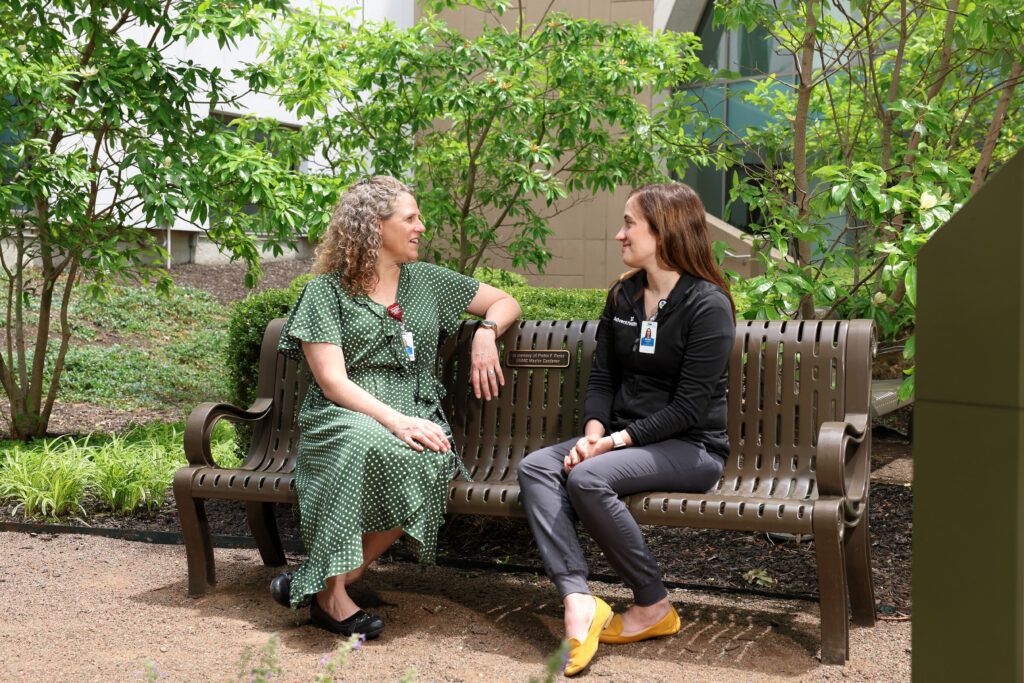
Stark and Huber both lead teams that extend spiritual care to providers and staff in outpatient medical offices and clinics, such as primary care offices. They work to first support their spiritual needs and also to teach them how to provide spiritual care to patients.
“We recognize that every patient visit is a spiritual visit, not just a physical visit,” Huber says. “We need to equip our providers and staff to be there to respond to and feel comfortable with providing that spiritual care. They can’t pour from an empty cup.”
Listening is Spiritual Care
AdventHealth describes spiritual care as connecting with people — both patients and team members — around what brings meaning and inspiration to their lives as expressed by feelings of love, joy and peace. Just as mental health screening questions have become commonplace in most doctor’s offices, AdventHealth has integrated spiritual health screening questions into every patient visit:
- Do you have someone who loves and cares for you?
- Do you have a source of joy in your life?
- Do you have a sense of peace today?
“What brings you love, joy and peace is deeply personal and different for everybody,” Stark says. “For some, it might be nature, being outside. Maybe they’re a runner. Maybe they fiercely love their family. Spirituality is not religious, although it can be. It is what brings you life.”
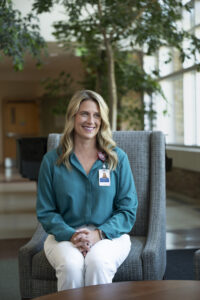
Though simple, these questions seem to reach people deeply and open doors to intimate conversations. Whether it is a provider or a patient, people immediately relate in a very personal way to the questions and are usually grateful to be asked and, more importantly, listened to.
While men predominantly make up the spiritual integration and hospital chaplaincy teams, women bring a unique perspective to the role. Some people may see women as more approachable and as listeners who support rather than fix. Research, in fact, shows that men and women do listen differently, although there is no evidence that either gender is better at listening. Women also may relate more instinctively to the work-family juggling act, Huber says.
“The burn-out challenges I see are systemic in society,” Huber says. “Many women who work full time and care for their families are the most affected because of the daily pressures they face.”
Being a female chaplain has some great advantages, Marin-Rodriguez says. “We serve a large population of soon-to-be-mothers who want a woman’s perspective. A Muslim woman, for example, who can only be seen by female caregivers provide a tremendous opportunity to interact with women of other faith traditions.”
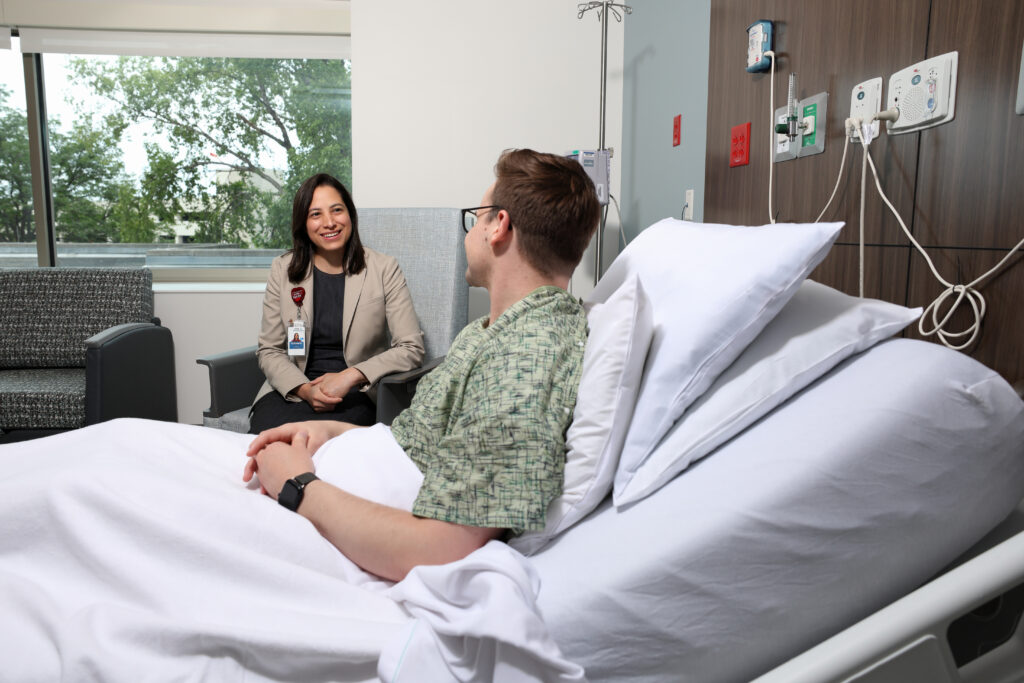
Although she has had two occasions when men refused to see her due to her gender, Marin-Rodriguez typically experiences the opposite of patients and providers wanting to talk to a woman. Women tend to be more open to another woman who will listen. Also, oftentimes men will open up more to a woman chaplain. “They may be going through a difficult family relationship or personal challenge. Or they want to begin a relationship with God or a higher being and they don’t know how to start. They seem more willing to share that vulnerability with a woman,” she says.
At the end of the day, though, all three women agree the most important characteristic is not gender but the ability to be present. “They want what everyone wants – to be seen and heard, not as a physician but as a person, as part of a team,” Stark says.
Before joining the spiritual integration team, Stark worked in clinical operations. She brings that business acumen into her current role and relates spiritual care directly to the mission.
“Brand loyalty is built by making sure we deliver on our promise to provide whole-person care,” she explains. “Why do we say we want to do whole-person care if we’re not doing spiritual care?”
Providing whole-person care starts with hiring the right people, Stark says. Through a program called Mission Fit, AdventHealth assesses the cultural fit of providers during the hiring process. They look for providers who believe in whole-person care, who handle conflict well and who are humble, Stark says.
“We want to know who we’re hiring as people, not just medical providers,” she says. “I’ve had many physicians tell me that no other entity has ever asked those questions.”


